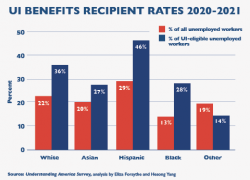
Former Secretary of Labor Frances Perkins once observed, "Our idea of what constitutes social good has advanced with the procession of the ages, from those desperate times when just to keep body and soul together was an achievement, to the great present when ‘good’ includes an agreeable, stable civilization accessible to all…”
That “accessible to all” is at the heart of recent efforts to ensure that the work of the federal government is available to all Americans.
As the Department of Labor implements the Biden-Harris administration’s groundbreaking executive order on advancing racial equity and support for underserved communities, we are taking a close look at data. We need high quality data to understand which populations our programs and protections reach (or don’t), potential barriers to access, and possibilities for expanding access to more workers.
We’re drawing on the expertise of researchers outside the department through our first-ever summer equity data challenge. Beyond informing our implementation of the equity E.O., we hope the challenge will support scholars, especially emerging scholars, in centering questions of equity in their own research.
After carefully reviewing dozens of strong applications, we announced the five finalists this week:
-
Eliza Forsythe and Hesong Yang of the University of Illinois at Urbana-Champaign
-
Alex Bell, TJ Hedin, Roozbeh Moghadam, Geoffrey Schnorr, and Till von Wachter of the California Policy Lab
-
Rebecca Johnson and Yuchuan Ma of Dartmouth College, Elizabeth Shackney of Texas RioGrande Legal Aid, and Cassie Davis of Texas Appleseed
-
Kelly Jones and Farah Tasneem of American University
-
Sarah Garcia of University of Minnesota-Twin Cites
These research projects will shed light on important questions, like:
-
Why are some racial and ethnic groups less likely to claim unemployment insurance benefits?
-
Why do unemployment insurance recipiency rates vary so dramatically across individual workers, communities and states?
-
What’s the best way to enforce labor standards for migrant agricultural workers?
-
How do design and administration affect federal and state paid leave programs, and what trade-offs are involved in setting an eligibility threshold?
-
What do workers with disabilities need to succeed?
We’re thrilled to be able to support these scholars in their research and excited to see how their work can inform our ongoing equity assessment. Ultimately, these projects will help the department better fulfill its mission of supporting all workers, job seekers and retirees, and making sure that our programs and resources are equally accessible to all Americans.
Learn more about the challenge, and learn more about our efforts to advance racial equity and support underserved communities.
Alexander Hertel-Fernandez is the deputy assistant secretary for research and evaluation at the U.S. Department of Labor.

 U.S. Department of Labor Blog
U.S. Department of Labor Blog



